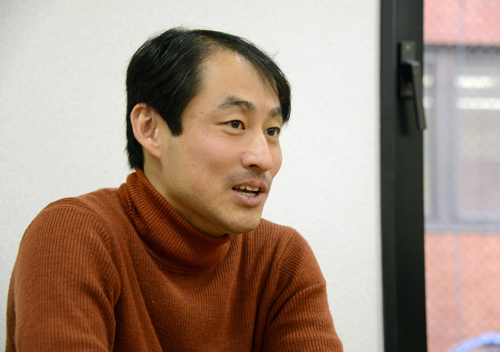
from Japan vol. 67 2014.04.24 Helping Fukushima get back on its feet with the power of music - activities of El Sistema from South America
![]()
El Sistema is a creative social education program which began in Venezuela. By giving children in impoverished areas wind and string instruments like violins free of charge, and teaching them how to play in groups, this program has rescued these children from a life of crime and drugs. El Sistema, which empowers children through music, has now spread to more than 50 countries around the world. In Japan, the very first program was launched in the city of Soma in Fukushima Prefecture. I spoke to Mr. Yutaka Kikugawa, who established Friends of El Sistema Japan to help with recovery efforts from the earthquakes and tsunamis, people who support this initiative, as well as the children of Soma. (Text by Mitsuko Iwai)
目次へ移動 ベネズエラ発の音楽革命
Have you ever heard of Gustavo Dudamel, a young Venezuelan conductor in his early 30s? He has shown excellent musical talent from his early years; for example, he became the music director of the Los Angeles Philharmonic in his 20s. Some people think of him as a reincarnation of Bernstein. He drew attention in Japan recently when Jun Matsumoto, a member of the pop idol group, Arashi, spoke about him and how touched he was when he listened to the Simon Bolivar Youth Orchestra of Venezuela, the orchestra Gustavo Dudamel currently directs, perform the song "Mambo."
Mambo conducted by Dudamel.
During the performance, the members of the orchestra stood up and shouted, "Mambo!" and danced, and this even got the audience going. The concert hall was transformed into a dance hall. I had never seen such a fun and energizing classical music concert.
The Simon Bolivar Youth Orchestra of Venezuela was created through Venezuela's national project, "El Sistema." This music education program was launched in 1975 by Professor Jose Antonio Abreu, a politician, musician, and economist, who aimed to provide free wind and string instruments and a place to learn music for all children in impoverished areas so that they could escape a life of crime and drugs. Dudamel also grew up with El Sistema, and this is where his talent began to shine.
We usually associated classical music with affluence, but by opening its doors to poverty-stricken children, Professor Abreu wanted to help children develop "pride." In other words, this was a social revolution empowered by music. By playing music every day, not only do the children hone their musical skills, but also develop independence and teamwork, which are both valuable social skills.
In 2009, Professor Abreu took part in "TED," a conference held in the US that helps share valuable ideas with people across the world, and won the TED Prize. Thereafter, El Sistema instantly began to gather interest in the US.
Professor Abreu's speech at TED.
Professor Abreu started El Sistema approximately 40 years ago with 11 children. Now, the program has spread across Europe and Asia, into 50 countries worldwide.
目次へ移動 "El Sistema" in Fukushima
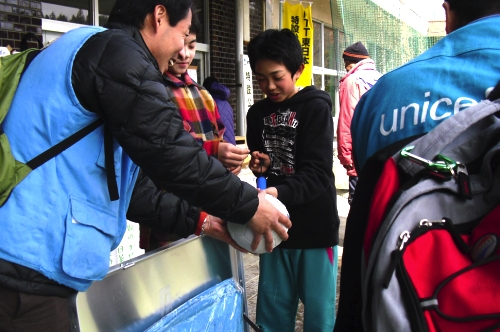 Mr. Kikugawa distributing recreation kits at the UNICEF shelter in Otsuchi, Iwate Prefecture. (c)Yutaka Kikugawa
Mr. Kikugawa distributing recreation kits at the UNICEF shelter in Otsuchi, Iwate Prefecture. (c)Yutaka Kikugawa
Fukushima Prefecture was hit hard by the Great East Japan Earthquake, tsunami, and the subsequent nuclear disaster. Mr. Yutaka Kikugawa began traveling across Tohoku as a chief coordinator for the Japan Committee for UNICEF's Japan Earthquake and Tsunami Emergency Relief immediately after the earthquake. During his time in Fukushima, he strongly felt that children who experienced immeasurable pain and suffering really needed a program that provided long-term care.
In December 2011, Mr. Fergus McWilliam, a hornist for the Berlin Philharmonic and a UNICEF Goodwill Ambassador, told Mr. Kikugawa that El Sistema could potentially help.
Mr. Kikugawa admired El Sistema, but because Japan is very different from Venezuela and many schools in Japan already had a music education program, he thought it would be difficult to implement in Japan.
Mr. McWilliam told Mr. Kikugawa to put aside all preconceptions and shared with him the story of how he started El Sistema back in his own country, Scotland.
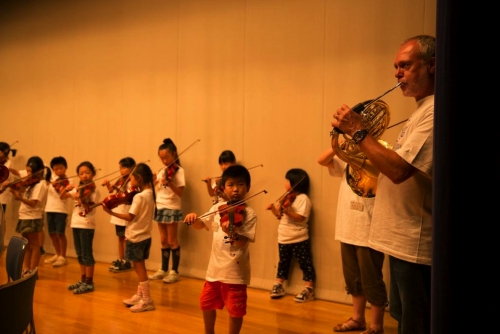 Mr. McWilliam (photo right).(c)FESJ/2013/Mariko Tagashira
Mr. McWilliam (photo right).(c)FESJ/2013/Mariko Tagashira
"Low birth rates and aging population, economic stagnation due to change in the industrial structure - these are problems Scotland has in common with Japan. But by working very closely with the community, we've been able to make it work. The situation in Fukushima is more serious and is in more need, so you should definitely do it."
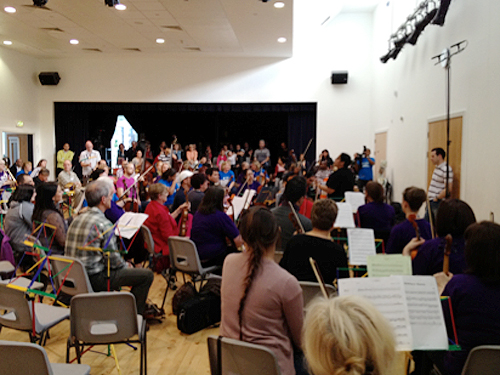 A session at an El Sistema in Scotland. The guest conductor from Venezuela led the children's orchestra, who performed for the adults (parents, teachers, people from the community) in the room.(c)FESJ/2012/Yutaka Kikugawa
A session at an El Sistema in Scotland. The guest conductor from Venezuela led the children's orchestra, who performed for the adults (parents, teachers, people from the community) in the room.(c)FESJ/2012/Yutaka Kikugawa
After speaking to his long-time friend, he became convinced that El Sistema actually could work in the Tohoku region.
One month before his discussion with Mr. McWilliam, Mr. Kikugawa listened to a speech delivered by a boy in sixth grade at the "Furusato Soma Children's Rehabilitation Conference" held in Soma City, Fukushima Prefecture, and was very moved by it. The boy said, "It will take Soma 20, 30 years to recover. That is going to be my life. I hope to learn a lot and take action so I can grow up to be the kind of person that can help build a new future for Soma."
The Great East Japan Earthquake Recital by children of Soma.
Through his activities in Fukushima, Mr. Kikugawa knew all too well that children as well as adults in Fukushima were worried about the future. "Recovery is a long-term process, and it really affects the lives of children. I was becoming increasingly aware that it's not only about providing temporary assistance."
"Music will help provide children with the courage they need to stand up against adversity." With this in mind, Mr. Kikugawa made a big decision. He established El Sistema Japan in March 2012. Then he signed an agreement in May with the city of Soma, and resigned from his position at the Japan Committee for UNICEF one week later.
目次へ移動 The pride of Soma
When asked why he decided to base the first office of El Sistema Japan in Soma, Mr. Kikugawa replied "ownership." Soma is an old castle town where you can still find traditional cultures that represent Fukushima such as Soma-Nomaoi and folk songs of Soma. "I've felt from long ago that this town has a strong sense of independence. To have a sustainable program, it's essential that the people of the region have ownership, and in this respect, I thought Soma would be a great place to start."
Fukushima is quite advanced when it comes to music. Soon after the war, in 1950, a concert band was created at all the elementary schools and junior high schools in the prefecture. But it was Soma that honed children's musical skills to the national level. In the 1960s, The Nakamura Daiichi Elementary School won the All Japan School Ensemble Grand Contest, starting an era of musical greatness. El Sistema in Soma is supported by people from this golden era of music.
For example, Mr. Kenji Goto, who worked as an apprentice at a local instrument store, joined the program as a valuable technical expert. He also helps repair string instruments. Mr. Akiyoshi Okazaki, a professor at Shobi University, who used to play in a concert band, volunteered to manage the stage performance.
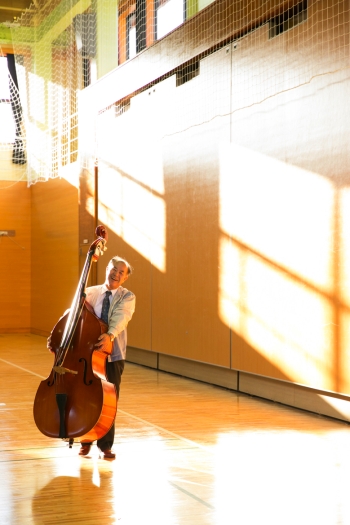 "There is a great understanding for learning music, here. I think learning music is a part of Soma's culture," says Mr. Goto. (c)FESJ/2013/Mariko Tagashira
"There is a great understanding for learning music, here. I think learning music is a part of Soma's culture," says Mr. Goto. (c)FESJ/2013/Mariko Tagashira
In order to make El Sistema work in Japan, the program must be made available to all children. Mr. Kikugawa believes that the activities of El Sistema Japan should be integrated with the school programs. One of the members of the city's board of education shared this belief and helped push this program forward greatly in Soma. Ms. Yoko Hoshi, who raised the Nakamura Daichi Elementary School's concert band to the national level again in the 1990s joined as the coordinator. More and more people joined these discussions, and the program started to take shape very smoothly.
The program began with experts visiting concert bands at elementary schools in Soma helping them purchase and repair instruments. "Doing what the schools really needs while respecting the traditions and pride of Soma." This is something similar to what Mr. Kikugawa constantly kept in mind while he assisted countries in Africa and other developing regions as a UNICEF employee. This was also what he agreed upon with Soma city's board of education.
"Elementary schools in afflicted areas are approached about aid events and workshops on a daily basis, which is quite exhausting for teachers. In order to get these weary teachers to accept our program, we have to provide the kind of help they want. Of course we're not always going to see eye to eye, but it's important to always try to stand in their shoes. I think this is key."
目次へ移動 Reconnecting and understanding
The city of Soma lost 458 people in the earthquake. Forty-four children lost their parents. Located 45km away from the Fukushima Daiichi Nuclear Power Station, the people of Soma did not have to evacuate from their homes, but the citizens have been hit hard by rumors. There are many people who have escaped from coastal regions, where much of the destruction occurred, and from areas where preparations are in place to lift the evacuation directive, Odaka Ward and Namie-machi Town.
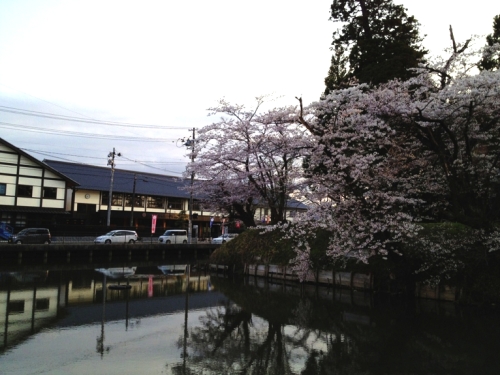 The old clan school, Nakamura Daiichi Elementary School, was rebuilt into a traditional Japanese architecture, right before the earthquake struck. The cherry blossom trees along the moat of the Nakamura Castle ruins near the school.(c)FESJ/2012/Yutaka Kikugawa
The old clan school, Nakamura Daiichi Elementary School, was rebuilt into a traditional Japanese architecture, right before the earthquake struck. The cherry blossom trees along the moat of the Nakamura Castle ruins near the school.(c)FESJ/2012/Yutaka Kikugawa
When El Sistema Japan began its activities, some parents said, "It's great to be able to get some form of exercise indoors." This was because children were unable to play outdoors as they wanted. We heard very sad stories from some of the children. They told us that right after the earthquake, they used to change and hide their mud-stained clothes after being outdoors to save their mothers from worrying.
Hayate Nakagawa, a third grade student who began playing the violin at El Sistema Japan's string instrument classes in the summer of 2013 was in kindergarten when the earthquake struck.
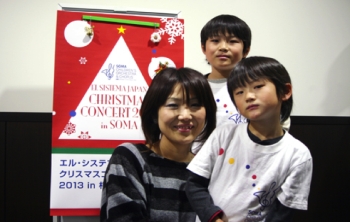 Hayate Nakagawa (back) and Hokuto (front) and their mother, Kozue.
Hayate Nakagawa (back) and Hokuto (front) and their mother, Kozue.
The home that he lived in with his grandmother was destroyed, and the graduation ceremony was cancelled. Because of the nuclear disaster, they had to move to Akita Prefecture. Had the earthquake not happened, he would have been a super excited soon to be first grader, but instead he had to spend his days in uncertainty and confusion. "My son was separated from his friends because of the earthquake. But he has been able to reconnect with some of them through El Sistema, so he is very happy, and I for him" said his mother, Ms. Kozue Nakagawa.
Mr. Kikugawa signed an agreement with the city of Soma, and El Sistema Japan first began by helping the activities of the board of education. In the summer of 2013, in addition to helping concert bands after school, the Soma Children's Orchestra's weekend string instrument classes kicked into gear. These classes are doing so well that they now have almost 100 students from elementary and junior high schools attending these classes.
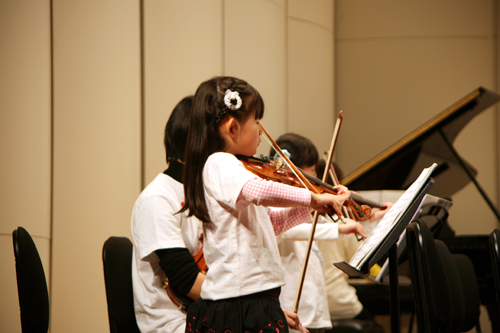
Pre-school kids have joined the classes now because their brothers and sisters are taking part. Because the classes now welcome a wider age group of children, they have become increasingly important as a place for all children, not just children in the concert bands at schools.
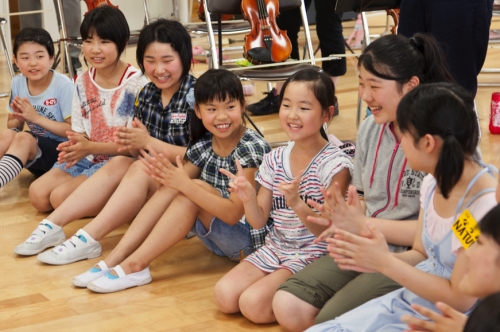 With El Sistema, children start by having "fun," to learn about how wonderful music can be. Laughter echoed through the classroom. (c)FESJ/2012/Ichiro Funakoshi
With El Sistema, children start by having "fun," to learn about how wonderful music can be. Laughter echoed through the classroom. (c)FESJ/2012/Ichiro Funakoshi
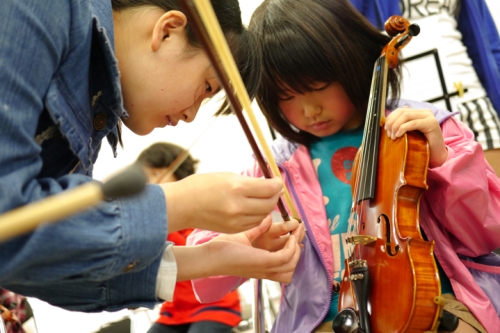 Children with experience teach beginners in "Peer Learning." (c)FESJ/2013/Mariko Tagashira
Children with experience teach beginners in "Peer Learning." (c)FESJ/2013/Mariko Tagashira
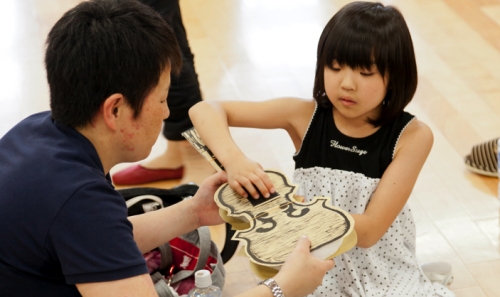 To learn how to use the instrument, children make paper violins with their parents.
(c)FESJ/2012/Ichiro Funakoshi
To learn how to use the instrument, children make paper violins with their parents.
(c)FESJ/2012/Ichiro Funakoshi
I asked these children what was it about string instruments that made them so much fun, and they said they love it "when all the sounds come together!" The environment in which these children live in differ significantly. Some children still live in temporary housing. But music has such a positive effect on them - playing music with their friends cheers them up and helps them relax.
目次へ移動 The first Christmas concert
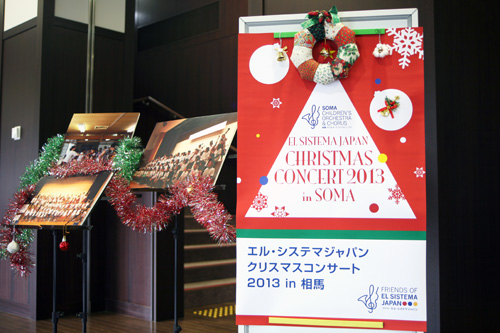
December 23, 2013, a Christmas concert with 135 children who take part in El Sistema Japan was held at the civic center in Soma.
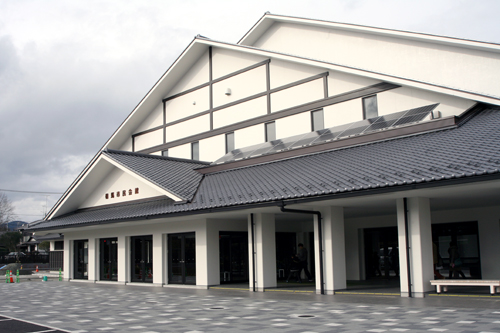 The concert was held in the civic center, which was rebuilt after being destroyed in the earthquake.
The concert was held in the civic center, which was rebuilt after being destroyed in the earthquake.
The chorus and orchestra that had been practicing separately until now was going to play together for the first time. It was the inaugural concert of the "Soma Children's Orchestra and Chorus."
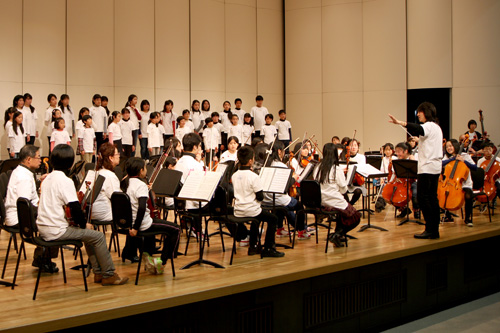 The rehearsal before the concert.
The rehearsal before the concert.
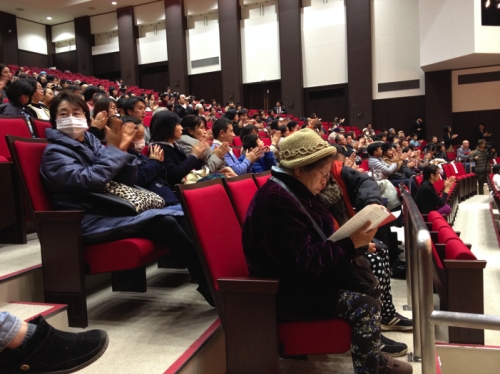 Children's family came to support their big performance.
Children's family came to support their big performance.
The first performance was by the "Soma Children's Chorus," which included children of Sakuragaoka Elementary School and graduates of the elementary school who were now in junior high school. Their clear voices resonated through the hall.
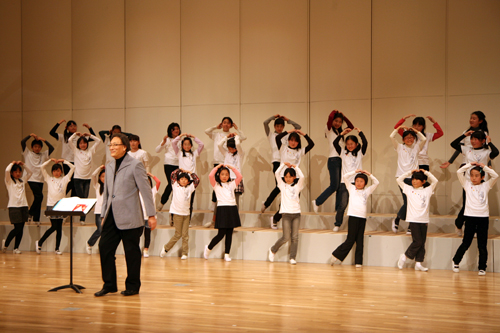 This is the pose they struck at the end of one of the songs, choreographed by the Japanese comedian, Lucky Ikeda.
This is the pose they struck at the end of one of the songs, choreographed by the Japanese comedian, Lucky Ikeda.
They also sang "Furusato (Home)" written by Mr. Kundo Koyama. Many children have sung this song, which was very popular at the NHK National School Chorus Contest.
 "Because you hang in there, you become stronger." Perhaps it reminded them of the hardship after the earthquake, but these words from the song, "Furusato," brought tears to the audience's eyes.
"Because you hang in there, you become stronger." Perhaps it reminded them of the hardship after the earthquake, but these words from the song, "Furusato," brought tears to the audience's eyes.
Sixth grade students of the Sakuragaoka Elementary School were invited to the fan day of the Rakuten Eagles baseball team, and sang this song in front of all the fans at Tokyo Dome. The children said that this overnight trip to Tokyo, which also served as a school excursion, was super exciting and exhilarating.
The second part was by the "Soma Children's Orchestra." The highlight of their performance was Vivaldi's Violin Concerto that they had practiced intensively.
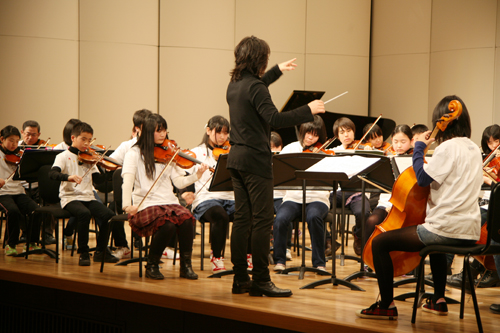
Last year in August, an advisor came from Venezuela and instructed Mr. Kikugawa to incorporate more high-toned songs because this would help children develop even better skills, and they started to do so. It was sweet how the conductor, Mr. Yohei Asaoka, kept nodding to the children throughout their performance to give them encouragement.
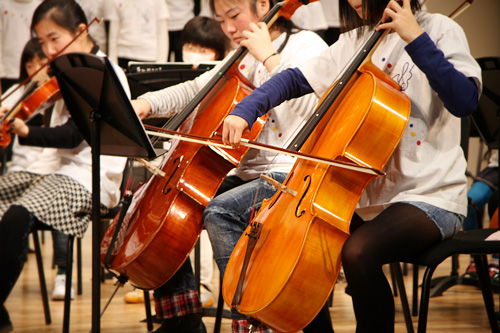 Softer, then louder - they played the songs as one.
Softer, then louder - they played the songs as one.
The third part was a collaboration between the orchestra and chorus. Mozart's Ave Verum Corpus, which began very strongly, was an incredible performance.
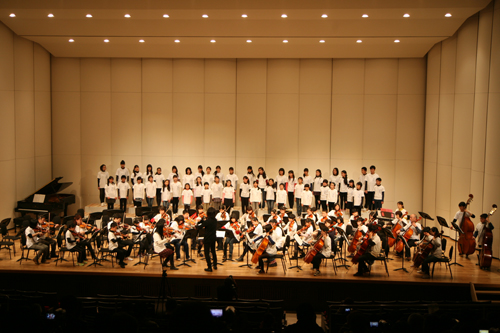
Finally, the nursery song, "Furusato (Home)." They performed the day's last song in style. Please take a look at the video and watch the children's gleaming faces as the audience breaks into applause.
The song was conducted by Mr. Fujio Furuhashi, known for his work with the NHK Tokyo Children's Choir. He is taking part in El Sistema Japan as the chorus advisor.
I spoke to the children after the concert.
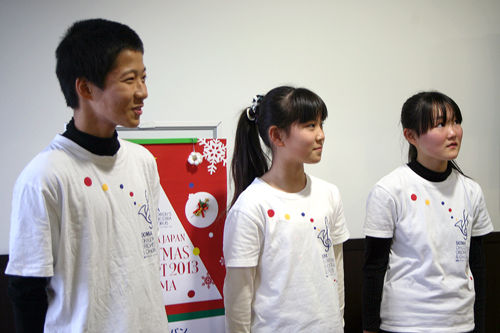
"I tried to put my feelings into the songs. I discovered today that children in the orchestra also had to struggle through difficult times and work hard. I hope to have more opportunities in the future to perform with them." (From the left, Wataru Suzuki, former member of the Sakuragaoka Chorus Group, and first year student at the Nakamura Daiichi Junior High School, Lena Yashima and Lena Momma, sixth grade students in the Sakuragaoka Chorus Group.
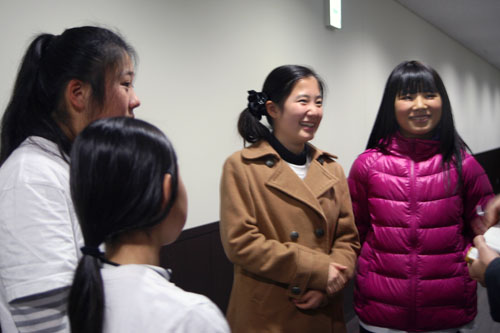
"Out of all the songs today, I like Vivaldi's the best. It's fast, and my fingers get tired, but learning how to play new songs makes me happy. Sometimes during class, I catch my fingers practicing. Recently, I've started to become more interested in classical music." (From the right, Ayuka Soeda (viola), Akane Kanno (viola), and Nina Sato (cello) first year students at Koyo Junior High School).
After the performance Mr. Yuzo Sakurai, a university student (fourth year at Waseda University), who volunteered as a fellow ensemble, was playing with the children who were finally free from the anxiety of performing.
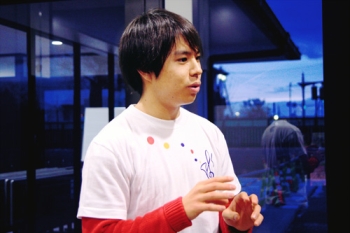
"It was the first time the orchestra and chorus performed together, so I think it was very inspiring for both groups. Everyone is in very high spirits today. I'm sure they are filled with a sense of accomplishment."
Mr. Goto, who helped make arrangements for instruments and provided maintenance, supporting the children from behind the scenes told me with a bright smile.
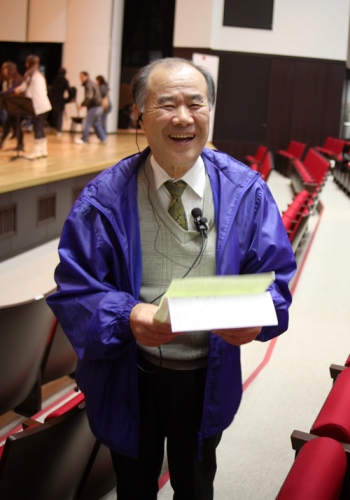
"It was a great success. But we didn't really do anything special just because this was a concert. We just focused on making sure the children had fun."
目次へ移動 A system without a system
El Sistema can be found in more than 50 countries worldwide. But I was surprised to hear that there aren't any specific policies or procedures that the organization in Venezuela has defined. El Sistema means "The System" in English, but what the organization insists upon is "not creating a manual."
Professor Abreu has made significant efforts to continue to push the activities of El Sistema to the next level so that they reflect the issues children face day to day, and says, "Although the essence is there, it has yet to take shape. The day you define a system, that's the day it'll lose its life." He values flexibility and diversity for all El Sistema initiatives that have sprung across the world. The one thing he makes sure doesn't happen is that it doesn't become a manualized program.
That is why El Sistema in each country is figuring out through trial and error what is best for them in terms of securing the necessary financial resources and organization. I asked Mr. Kikugawa what is next on the horizon for El Sistema Japan.
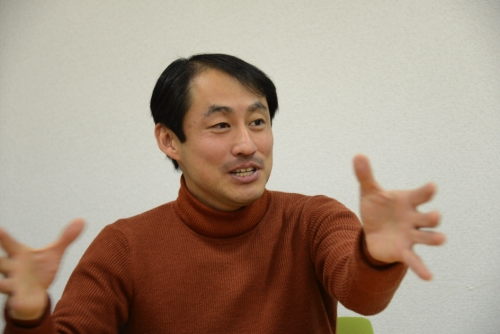
What are the key characteristics of El Sistema Japan in Soma?
"The American writer, Tricia Tunstall, who wrote the book "Changing Lives: Gustavo Dudamel, El Sistema, and the Transformative Power of Music," which documents the history of El Sistema, also visited Soma, and South Korea afterwards, and she said that the "approaches in these 2 countries are completely differently. It's very interesting." In Korea, the El Sistema was implemented in 2010 to help alleviate the economic inequality and to tackle poverty. It is the only El Sistema outside of Venezuela that receives a considerable budget from the national government.
What's great about Soma is that it's not a top down approach. It's very down to earth and values communities, and this is something that I hope to continue. I feel a strong affinity towards El Sistema Scotland, which is what encouraged me to start El Sistema Japan. In Scotland, they say that they spent 5 years in the first region.
Currently, El Sistema Japan runs on the reconstruction budget provided by the Ministry of Education, Culture, Sports, Science and Technology, and donations from companies, organizations and individuals, so it may be realistic to continue to work in regions that have been afflicted by the earthquake, but I want to make sure that the commitment won't be a transient one. And I also feel blessed because the mayor and board of education of Soma understand what I'm trying to do."
I heard you're also considering integrating third-party evaluation.
"Flexibility is one of the benefits of El Sistema, but non-profit organizations must respond to results-based accountability. This is something that is already well accepted in the United States.
For Soma, we've invited Professor Toshifumi Kariyado of the Aoyama Gakuin University to our workshops, so that he can research and evaluate how meaningful the interactions between children at our workshops are.
Such third-party evaluation will add credibility to our activities. Although El Sistema is about musical education, I don't think that we necessary have to stay within these confines. It can be beneficial to education and as a method in a more broader sense."
Mr. Kikugawa used to play the saxophone in his school's brass band. He realized working in various African countries (South Africa, Lesotho, Eritrea) as a UNESCO UNICEF employee the unfathomable power of music. "I remember very clearly how comforting music and dancing was when I lived in Africa. Nelson Mandela's words, 'It is music and dancing that makes me at peace with the world and at peace with myself' continues to inspire me."
Although Mr. Kikugawa is very attuned to the community, he's also not afraid to introduce new and bold activities. His interesting experiences abroad have helped him become the person that he is today.
目次へ移動 The power of music
Mr. Kikugawa points out that, "Although Japan has a music education framework, it isn't really widely available to everyone. There is an apparent difference between large cities and rural areas."
Professor Abreu of Venezuela has been a strong advocate of offering "the best music to all." So Soma has welcomed amazing guests like the Berlin Philharmonic for a mini concert and people from El Sistema USA for summer classes.
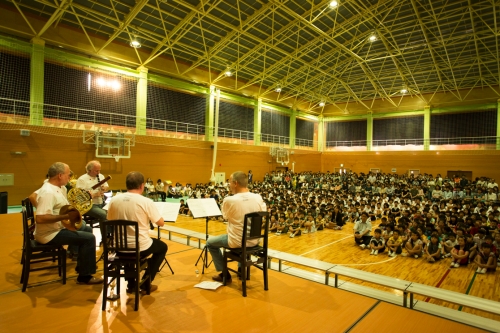 Berlin Philharmonic Wind Quintet concert & exchange held in Soma in September last year. (c)FESJ/2013/Mariko Tagashira
Berlin Philharmonic Wind Quintet concert & exchange held in Soma in September last year. (c)FESJ/2013/Mariko Tagashira
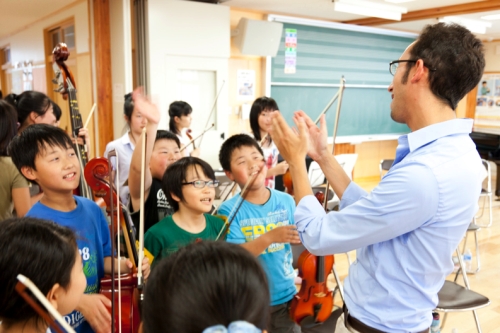 Summer classes held with representatives from El Sistema USA. The children had loads of fun, too.
(c)FESJ/2012/Ichiro Funakoshi
Summer classes held with representatives from El Sistema USA. The children had loads of fun, too.
(c)FESJ/2012/Ichiro Funakoshi
One of the biggest charms of El Sistema is that even though you might live in a rural area, you still get an opportunity to learn from the world's top-class musicians. Children also get to take part in many concerts. They seemed to have developed excellent confidence from having many performances now under their belt.
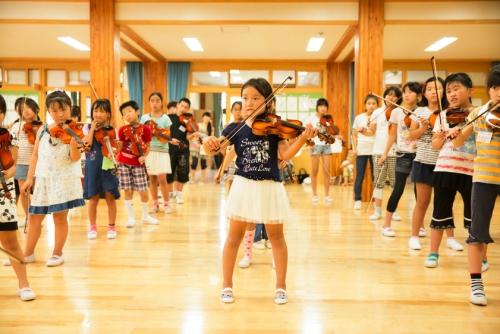 (c)FESJ/2013/Mariko Tagashira
(c)FESJ/2013/Mariko Tagashira
During these interviews, I realized time and time again, just how great the "power of music" is. Listening to notes vibrate and resonate with your ears, feeling the music with your heart, and creating these notes with your hands - these are traits unique to music embodiment. Nowadays, there are many sources from which we get information indirectly, but I realized how important it is for children of Fukushima to be provided with opportunities for "direct" involvement on a long-term basis.
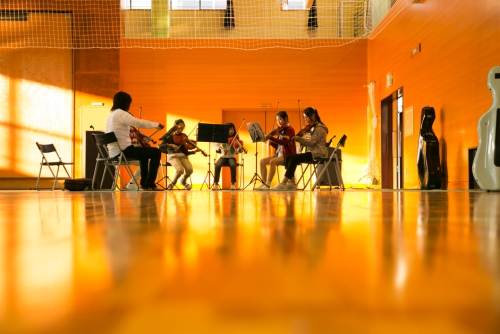 (c)FESJ/2013/Mariko Tagashira
(c)FESJ/2013/Mariko Tagashira
The pain and suffering children have undergone as a result of the earthquake and nuclear disaster can't possibly be covered in one interview and their wounds run unfathomably deep. With words, we can sometimes inadvertently cause someone pain, but communication via music helps soften the conversation. Music transcends words and helps communicate the full range of the children's emotions.
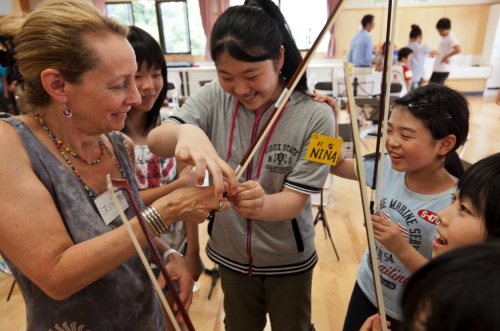 Children teaching Mrs. Jamie Bernstein (the daughter of late Mr. Bernstein) how to hold the violin bow.(c)FESJ/2012/Ichiro Funakoshi
Children teaching Mrs. Jamie Bernstein (the daughter of late Mr. Bernstein) how to hold the violin bow.(c)FESJ/2012/Ichiro Funakoshi
People in Fukushima have lost their ties to the community as a result of the earthquake and the nuclear disaster. The process of reestablishing such ties is similar to an orchestra building on notes to create music. The people of Soma have dreamt of building a children's orchestra for 50 years. I hope that Japan's first El Sistema and the children of Fukushima will grow up in a healthy environment with the kind help of such people, schools in the regions, supporters nationwide, and musicians from all across the world.
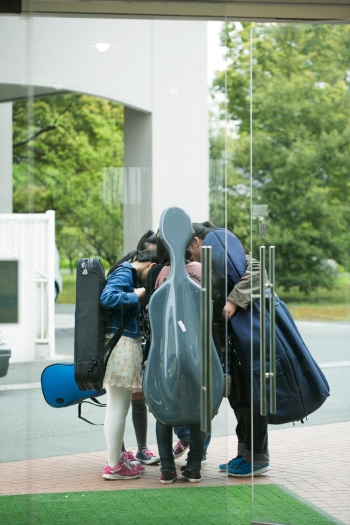 (c)FESJ/2013/Mariko Tagashira
(c)FESJ/2013/Mariko Tagashira
★To make a donation to El Sistema Japan:
http://www.elsistemajapan.org/donation.html
Related websites (in Japanese):
El Sistema Japan(http://www.elsistemajapan.org)
facebook(https://www.facebook.com/elsistemajapan)
Reference literature:
"Toppasuru Kyoiku (Breakthrough Education)" by Akira Ikegami and Yuriya Masuda (Iwanami Shoten)
"Changing Lives: Gustavo Dudamel, El Sistema, and the Transformative Power of Music," by Tricia Tunstall.(東洋経済)
Mitsuko Iwai biography:
She became a freelance writer after working at the local museum and newspaper. Preferring to write about things that "do not change" rather than things that "do change," she launched the magazine "Satomitsushin," which covers the life of one fruit farmer. 2007 she began working as an editorial staff of Think the Earth, Earth News. She also edits "ecoshare," a report on Lumine's environmental activities, "choroko."She also has a column on food and farming in the regional paper. She currently resides in Takasaki City.
Report and text by: Mitsuko Iwai
Photographs by: Tomomi Hasebe, Soichi Ueda (Think the Earth)
Translated by: Yuri Morikawa (oxygen inc.)















